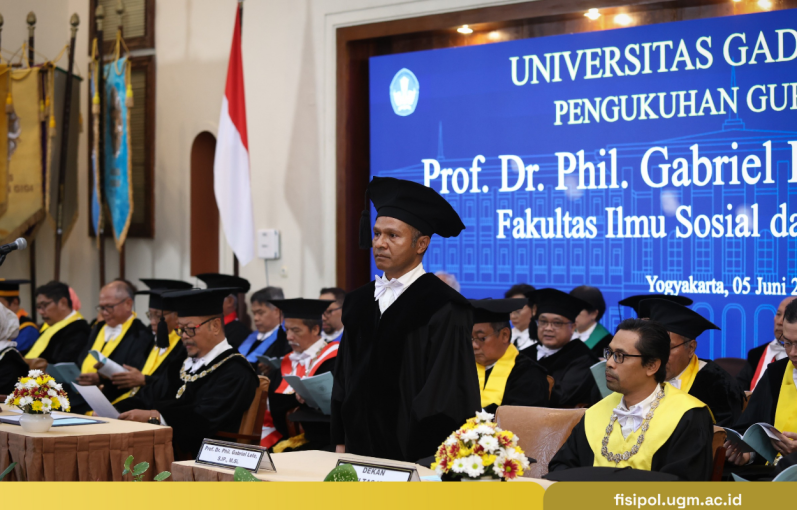
Yogyakarta, 11 June 2025–Prof. Dr. Phil. Gabriel Lele, S.IP., M.Si, Lecturer of Public Policy and Management, was officially inaugurated as Full Professor of Public Policy Governance on Thursday (5/6). The issue of democracy is one of his concerns about the country’s socio-political conditions. Through his speech, entitled ‘Democracy Beyond Election: Agonistic Public Policy as a Transformation Agenda,’ Gabriel highlighted several trends in the current pattern of democracy, including authoritarianism, populism, and policy uniformity.
Democracy is not merely a procedural system, but one that is also lived and instilled in a substantial way. In terms of managing public policies, public participation is the main breath in the implementation of democracy. The public, as the highest power holder, should be able to influence the direction of government policy. Unfortunately, what is happening today is contrary to the principles of democracy. Gabriel emphasised that the root of the problem creates new conflicts in the current government’s public policies.
“Democracy must live in public policy as a space for equal encounters between citizens. Public policy should not be a tool of power that silences, but should be an arena of equal differences,” said Gabriel. Several policies are deemed insufficient to articulate the government’s vision for addressing problems. Instead, they have the potential to create greater conflict. Of course, the community will be the most affected. This can be seen in various controversial policies, such as the relocation of the National Capital City (IKN), the Free Nutritious Meal program (MBG), and the establishment of the Merah Putih Cooperative, as well as several controversies that accompany national strategic projects (PSN).
According to Gabriel, there is a tendency to ignore plurality and close the space for public participation. The democratic system indeed prioritises the representation of the interests of every element of society. In the process, there is often an advocacy process of different interests between groups. For example, people protest or demonstrate against particular government policies. However, instead of mediation and discussion, this process is often viewed as a conflict that threatens the country’s stability. Gradually, centralised power is formed, the role of the opposition is weakened, and there is no room for public participation in the government.
“Public policies are often drafted in closed spaces, when they should be bright spaces where all voices can be heard,” Gabriel explained. The statement highlighted several instances where the government failed to maintain open communication with the public. A clear example occurred in the passing of the TNI Bill, which caused a flurry of public anger.
Under these conditions, Gabriel introduced an agnostic perspective that recognises that conflict is not something to be avoided, but managed as part of the dynamics of a plural society. The existence of conflict in a democratic system suggests that public interests have not been adequately considered. In addition, conflict also indicates that democracy remains alive and continues to evolve and strengthen. Therefore, conflict should not be viewed as something that threatens the state, but rather as an integral part of the nation’s democratic life.
Universities, as one of the centres of public knowledge, play a crucial role in upholding the essence of the democratic system. Gabriel’s perspective reminds us of the responsibility of universities to provide spaces for discussion, so that they can always enlighten the nation’s life. It is hoped that the inauguration of Prof. Gabriel as one of 531 active professors at Universitas Gadjah Mada will contribute to the development of social and political science in the future.
